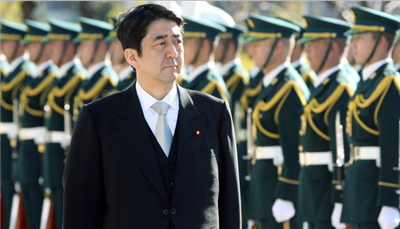(单词翻译:单击)
Japan’s Prime Minister Shinzo Abe will this week push ahead with plans to loosen rules governing the military, even as analysts warn this could squander political capital needed to pursue tough economic reforms.
日本首相安倍晋三(Shinzo Abe)本周将推行多项计划,放宽有关军事的法规——尽管分析师警告说此举或耗尽安倍的政治资本,而这些政治资本又是他推行艰难的经济改革所需的。
The military reform, a significant shift in Japan’s pacifist outlook, is just one piece of legislation scheduled for approval this summer.
这次军事改革虽然只涉及要在今年夏天通过的一项立法,却是对日本和平前景的一次重大转变。

Parliament normally closes in June but, according to political analysts, Mr Abe is set to prolong the current session into August as he pursues economic reform. The summer of legislation will be crucial for the prime minister’s Abenomics stimulus, which is aimed at ending 20 years of on-and-off deflation and restoring the country to sustainable growth.
日本议会通常会在6月份闭会。然而根据政治分析人士的说法,由于要开展经济改革,安倍会把目前的会期延长到8月份。对于安倍的“安倍经济学”(Abenomics)经济刺激举措来说,今年夏天的立法至关重要。安倍推行安倍经济学的目的,是为了结束日本20年内不时出现的通缩,令日本经济恢复可持续增长。
But if Mr Abe sacrifices too much political capital on the security changes, it could threaten his ability to pass structural economic reforms — the so-called “third arrow” of Abenomics.
然而,如果安倍牺牲太多政治资本用于防务改革,可能会威胁到安倍令结构性经济改革举措(即所谓安倍经济学“第三只箭”)在议会通过的能力。
“This could well lead to a 10 percentage point fall in the approval rating for the Abe cabinet,” said Takao Toshikawa, editor of the political newsletter Tokyo Insideline.
东京《内幕》(Insideline)杂志主编岁川隆雄(Takao Toshikawa)表示:“这很可能导致安倍内阁的支持率下降10个百分点。”
The ruling Liberal Democratic party and its Komeito coalition partner signed off on the package of security bills on Monday. They are set for cabinet approval on Thursday and could reach parliament by Friday.
周一,日本执政党自民党(LDP)及其盟友公明党(Komeito)签署了一系列防务法案。这些法案将在周四由内阁审批通过,并可能在周五提交议会。
The security bills will put into effect a new US-Japan defence agreement and last summer’s reinterpretation of Japan’s pacifist constitution by Mr Abe. They are based on the principle that Japan can and should fight to protect its allies, rather than merely fend off direct attacks on its territory.
这些防务法案将落实美日新的防务协议,以及安倍去年夏天对日本和平宪法的重新解释。它们的出发点,是日本能够、也应该为保护其盟国作战,而不是仅仅抵御对其领土的直接袭击。
One bill creates a framework for Japan’s military to provide logistical support for multinational peacekeeping forces. Another revises ten different laws governing Japan’s military and its response to armed attacks.
其中一个法案为日本军方向多国维和部队提供后勤支持划定了框架。还有一个法案则对十条约束日本军队及其对武装袭击的回应方式的法律做了修改。
The security changes are unpopular with the public. A recent poll for JNN showed 46 per cent of the public against the changes compared with 36 per cent in favour. That may get worse as the measures go through parliament.
公众对这次防务改革并不欢迎。最近,日本新闻网(JNN)的一次民调显示,46%的公众反对这次改革,支持这次改革的则只有36%。随着这些改革举措进入议会讨论阶段,公众的支持率可能会进一步下降。
“Opposition parties will likely leverage public sentiment to prolong the debate,” said Tobias Harris, an analyst at Teneo Intelligence.
特尼欧情报公司(Teneo Intelligence)分析师托拜厄斯•哈里斯(Tobias Harris)表示:“反对党很可能会借助公众情绪,将争论拖延下去。”
Mr Abe’s approval ratings are hovering above 50 per cent and he has generally moved cautiously on reforms in order to keep it there. He has tried to show the public he is prioritising the economy rather than his own goal of security and constitutional reform.
目前,安倍的支持率维持在50%以上。为确保支持率不变,安倍在行动时通常会十分小心。他试图向公众证明,他把经济摆在了首位,而不是自己在防务和宪法改革方面的目标。
But after a strong LDP performance in April’s local elections, Mr Abe has a breathing space before his own re-election as party leader in September, and then upper house elections next year. That makes it one of the best opportunities he will have to pass legislation to reform the economy.
不过,4月份自民党在地方选举中的出色表现,为安倍赢得了一段喘息时间,9月份安倍才会再次竞选自民党领导人,接着会在明年举行众议院选举。这也成为了安倍通过经济改革立法的最佳机遇期之一。
Attacked in parliament for telling the US Congress he would pass the law this summer before submitting it to the legislature, Mr Abe said he had been signalling his intention since last year. “In no way is this contempt for parliament,” he said.
在日本议会,有人抨击安倍不该在将法案提交立法机关之前,就在美国国会表示会通过这一法案。安倍表示,他从去年起就一直在表达他的意图。他说:“这对议会没有任何不敬之意。”
Mr Toshikawa said the prime minister would try to push a series of less popular economic measures, such as agricultural and labour market reform, through parliament during the next few months on top of the security legislation.
岁川隆雄表示,今后几个月里,除了防务方面的立法,安倍还会试图向议会提出一系列不太受欢迎的经济举措提案,比如农业及就业市场改革举措。
Mr Abe will hope the sense of economic momentum from a rising stock market sustains his support. He could then turn to more popular areas of policy in the autumn, such as measures to support families, and seek to rebuild his popularity with the public.
安倍希望,不断攀升的股市催生的经济乐观情绪,能维持住他的支持率。接着,他可能会在秋天转向更受欢迎的政策领域——比如支持家庭的举措,并试图重建在公众中的人气。


